
BTO and the NCE Seafood Innovation Cluster are hosting a workshop on “Blue sea – green business opportunities”on May 22. How can companies in the blue sector strengthen the sustainability in their business model through digitalization, recycling, reparation and reuse? How can researchers contribute to added value in the private sector’s RND and innovation efforts through project collaboration? We welcome companies and researchers to join us on May 22 to discuss these important subjects!
Marineholmen Makerspace is a nonprofit place at BTO where everyone can create – everything.
This is the place to learn new stuff, fix old stuff, build, prototype, test, share ideas and to have fun. In short, learning by doing. 450 m2located at BTO with machines as CNC-router, laser cutter, 3D-printers, vinyl cutter, sewing machines, overlock sewing machine and tools as dremel, drill press and handheld tools, oscilloscope, reworking station, multi meter, power supply, soldering stations, function generator, electronic load. A well-equipped wood shop and electronic reworking station, and more… 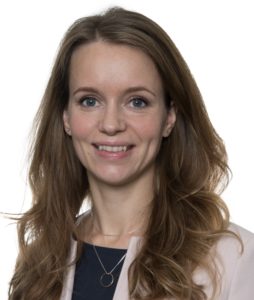
Curious and want to learn more about the makerspace or want help with funding, patenting considerations, contracts and collaboration with the industry? Contact BTO by phone/mail or meet Elisabeth on May 24 at the institute (the office next to the reception).
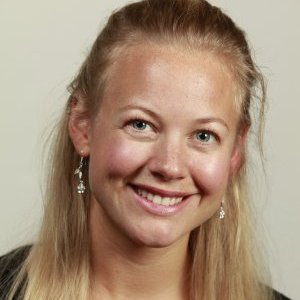 Cecilie Evjen har nylig blitt ansatt som forskningskoordinator/rådgiver, og skal dele dagene sine mellom Kjemisk Institutt og IFT. Hennes bakgrunn er en uvanlig kombinasjon av human toksikologi, prosjektledelse og entreprenørskap. Hennes forskningsinteresser har tatt henne fra laboratorieforskning innen nanoteknologi til studier på forurenset drikkevann i Nord-Tanzania – og mange ting i mellom!
Cecilie Evjen har nylig blitt ansatt som forskningskoordinator/rådgiver, og skal dele dagene sine mellom Kjemisk Institutt og IFT. Hennes bakgrunn er en uvanlig kombinasjon av human toksikologi, prosjektledelse og entreprenørskap. Hennes forskningsinteresser har tatt henne fra laboratorieforskning innen nanoteknologi til studier på forurenset drikkevann i Nord-Tanzania – og mange ting i mellom!
I Det Norske Videnskaps-Akademi koordinerte Cecilie et grunnforskningsprogram som er et samarbeid mellom industri og akademi. De siste par årene overtok riktignok eventyrlysten, og hun seilte i en tradisjonell norsk seilskute rundt hele Amerikas kontinent. Isen og havet fascinerte henne, og hun dro derfor til Antarktis for å jobbe på større båter og i felt med pingviner og hvaler som en del av arbeidsdagen.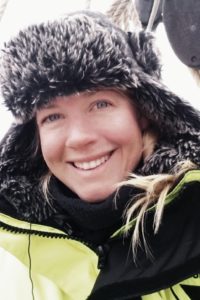
Tilbake i Norge, bestemte Cecilie seg for å flytte til Bergen og bli kjent med forskningen og menneskene på UiB. Her vil hun bistå forskere på Kjemisk Institutt som søker finansiering fra for eksempel Forskningsrådet eller Horisont 2020. Snakk med henne dersom du planlegger en søknad om ekstern finansiering!
This week we have taken part in two dissertation ceremonies at our department, for Kjersti and Coralie. Those of you hanging in to the very end of these events, heard professor Francis state that the evaluation committee had accepted both the presentation and the defence and that the University Board would be notified accordingly. Some may wonder what happens next? The answer to this is the Doctoral degree award ceremony, in which the newly appointed Doctores receive their Latin diploma (with an English translation attached) in a formal ceremony in the University Aula, along with an official transcript that constitutes the authoritative documentation of the PhD degree to be presented when requested later in the career.
Today, there was Doctoral degree award ceremony taking place in the Aula, and three graduates from the Chemistry department received their diplomas: Annette, Festo and Andrey. Present to savor the moment and share in the victories, were their former supervisors (Doctor parents) and Hege ((c) photos)!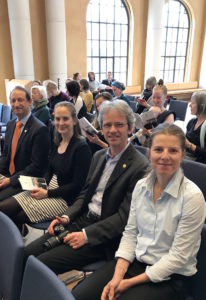
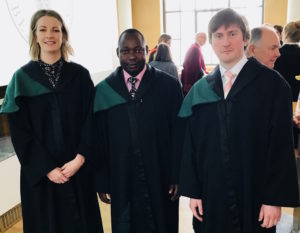
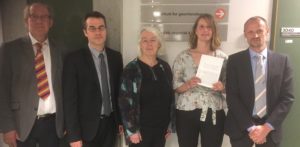 Today Coralie Celine Quadri successfully and with stamina defended her PhD thesis, titled N-Heterocyclic Carbene Complexes of Titanium as a Novel Class of Catalysts for the Copolymerization of Cyclohexene oxide with CO2. She has spent a couple of years away from the department writing up her thesis, which made for nice reunions on this joyous event.
Today Coralie Celine Quadri successfully and with stamina defended her PhD thesis, titled N-Heterocyclic Carbene Complexes of Titanium as a Novel Class of Catalysts for the Copolymerization of Cyclohexene oxide with CO2. She has spent a couple of years away from the department writing up her thesis, which made for nice reunions on this joyous event.
Kjersti Hasle Enerstvedt successfully and confidently defended her thesis on home turf (Tripletten) today. Her PhD project and now, thesis, Analysis of polyphenolic content in marine and aquatic angiosperms from Norwegian coastal waters, is an important step in furthering chemistry with a marine focus at the Chemistry department.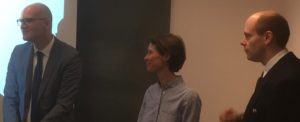
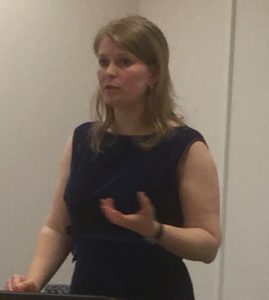
June 18: HSE-day at the Chemistry dept. The event is compulsory and lasts full office hours until 15h00. Please note, you will receive invitation for a social continuation starting at 15h15. June 19: Celebrating Leiv Sydnes – chemist, educator, world citizen and in a couple of months, Emeritus Professor! Save the time-slot 12h-14h.
På onsdag gav Urix-redaksjonen i NRK ein grundig presentasjon av kunnskapsbasen for bruk av kjemiske våpen i Syria og dei store menneskelege lidingane knytt til dette, sjå her for avspeling av programmet. 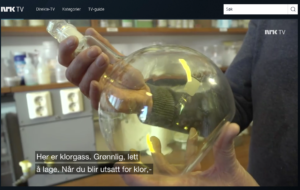 Professor Leiv Kr. Sydnes står sentralt i det internasjonale arbeidet knytt til avvikling av kjemiske våpen. Han er ein gjennomgangsperson i Urix-programmet og gir m.a. innføring i historia til kjemiske våpen, viser kjemisk struktur av utvalde kjemiske stridsmidlar (ved imponerande tavleteknikk), og tek fram dei etiske problemstillingane som ligg bak forbodet mot kjemiske våpen. Formidling av øvste klasse.
Professor Leiv Kr. Sydnes står sentralt i det internasjonale arbeidet knytt til avvikling av kjemiske våpen. Han er ein gjennomgangsperson i Urix-programmet og gir m.a. innføring i historia til kjemiske våpen, viser kjemisk struktur av utvalde kjemiske stridsmidlar (ved imponerande tavleteknikk), og tek fram dei etiske problemstillingane som ligg bak forbodet mot kjemiske våpen. Formidling av øvste klasse.
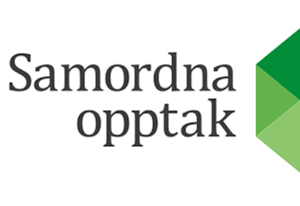 I dag blei førebels søkjartal offentleggjort frå Samordna opptak. Nytt av året er innføring av skjerpa opptakskrav om full fordjuping i realfagsmatematikk (R2), og det var uro for at dette vil gå hardt ut over talet på søkjarar til programma våre. Basert på førebels tal på søkjarar som har prioritert kjemiprogrammet på topp, ser dette ikkje ut til å slå til! I år har vi 23 førstepri-søkjarar mot 21 i fjor. Endringa er liten også for PTEK, 21 mot 22 i 2017. Både farmasi og nanoteknologi viser betydeleg reduserte søkjartal (ned mellom 30 og 40%), til hhv 63 og 23 pri-I søkjarar. Vi vil likevel få godt kvalifiserte studentar til desse studieprogramma. Det nyaste studieprogrammet vårt, medisinsk teknologi, har 76 pri-I søkjarar til 22 plassar og fortset dermed i same spor som i haust. Dette er oppløftande!
I dag blei førebels søkjartal offentleggjort frå Samordna opptak. Nytt av året er innføring av skjerpa opptakskrav om full fordjuping i realfagsmatematikk (R2), og det var uro for at dette vil gå hardt ut over talet på søkjarar til programma våre. Basert på førebels tal på søkjarar som har prioritert kjemiprogrammet på topp, ser dette ikkje ut til å slå til! I år har vi 23 førstepri-søkjarar mot 21 i fjor. Endringa er liten også for PTEK, 21 mot 22 i 2017. Både farmasi og nanoteknologi viser betydeleg reduserte søkjartal (ned mellom 30 og 40%), til hhv 63 og 23 pri-I søkjarar. Vi vil likevel få godt kvalifiserte studentar til desse studieprogramma. Det nyaste studieprogrammet vårt, medisinsk teknologi, har 76 pri-I søkjarar til 22 plassar og fortset dermed i same spor som i haust. Dette er oppløftande!

Recent week’s events in Syria and UK have again taken chemical weapons to the headlines. Many will know about the central role that OPCW (Organisation for the Prohibition of Chemical Weapons, Nobel Peace Prize laureate in 2013 ) plays in overseeing the implementation of and adherence to the Chemical Weapons Convention (CWC, Convention on the Prohibition of the Development, Production, Stockpiling and Use of Chemical Weapons and on their Destruction.)
Professor Leiv Kr. Sydnes at our department has released an insightful comment on the various claims appearing the mass media, the difficulties in tracing the origins of a specific sample of a chemical, and what it would take to curb further production of chemical weapons. Please consult his Nature Comment here. Quoting, Research chemists, especially in universities, should work to raise awareness of the chemical challenges related to the CWC. A first step would be to make the convention mandatory reading for all chemistry students. Second, OPCW educational material should be used in university courses. Third, The Hague Ethical Guidelines should be used to improve the ethical framework of the chemical profession.[Sydnes, Nature 556, 293-295 (2018)]
Professor Sydnes has contributed strongly to the work of OPCW through twice chairing the revision of the CWC, mandatory to take place every five years. He reflects on this work in an interview with På Høyden (in Norwegian) here.
Markus Baumann har mastergrad i farmasi fra Tromsø og doktorgrad i organisk syntese og legemiddelkjemi fra UiB i 2016.
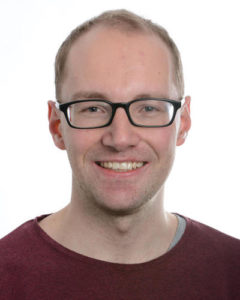
Han ansettes som postdoc i gruppen til Thomas Arnesen ved Institutt for Biomedisin med delt arbeidssted mellom Institutt for Biomedisin og Kjemisk institutt, der han skal jobbe i gruppen til Bengt Erik Haug. Stillingen er finansiert gjennom et FRIPRO Toppforsk stipend fra Norges forskningsråd til Thomas Arnesen. Markus skal jobbe på prosjektet ‘N-terminal acetylering som en fysiologisk nøkkelregulator.


 Cecilie Evjen har nylig blitt ansatt som forskningskoordinator/rådgiver, og skal dele dagene sine mellom Kjemisk Institutt og IFT. Hennes bakgrunn er en uvanlig kombinasjon av human toksikologi, prosjektledelse og entreprenørskap. Hennes forskningsinteresser har tatt henne fra laboratorieforskning innen nanoteknologi til studier på forurenset drikkevann i Nord-Tanzania – og mange ting i mellom!
Cecilie Evjen har nylig blitt ansatt som forskningskoordinator/rådgiver, og skal dele dagene sine mellom Kjemisk Institutt og IFT. Hennes bakgrunn er en uvanlig kombinasjon av human toksikologi, prosjektledelse og entreprenørskap. Hennes forskningsinteresser har tatt henne fra laboratorieforskning innen nanoteknologi til studier på forurenset drikkevann i Nord-Tanzania – og mange ting i mellom!


 Today Coralie Celine Quadri successfully and with stamina defended her PhD thesis, titled N-Heterocyclic Carbene Complexes of Titanium as a Novel Class of Catalysts for the Copolymerization of Cyclohexene oxide with CO2. She has spent a couple of years away from the department writing up her thesis, which made for nice reunions on this joyous event.
Today Coralie Celine Quadri successfully and with stamina defended her PhD thesis, titled N-Heterocyclic Carbene Complexes of Titanium as a Novel Class of Catalysts for the Copolymerization of Cyclohexene oxide with CO2. She has spent a couple of years away from the department writing up her thesis, which made for nice reunions on this joyous event.

 Professor Leiv Kr. Sydnes står sentralt i det internasjonale arbeidet knytt til avvikling av kjemiske våpen. Han er ein gjennomgangsperson i Urix-programmet og gir m.a. innføring i historia til kjemiske våpen, viser kjemisk struktur av utvalde kjemiske stridsmidlar (ved imponerande tavleteknikk), og tek fram dei etiske problemstillingane som ligg bak forbodet mot kjemiske våpen. Formidling av øvste klasse.
Professor Leiv Kr. Sydnes står sentralt i det internasjonale arbeidet knytt til avvikling av kjemiske våpen. Han er ein gjennomgangsperson i Urix-programmet og gir m.a. innføring i historia til kjemiske våpen, viser kjemisk struktur av utvalde kjemiske stridsmidlar (ved imponerande tavleteknikk), og tek fram dei etiske problemstillingane som ligg bak forbodet mot kjemiske våpen. Formidling av øvste klasse. I dag blei førebels søkjartal offentleggjort frå Samordna opptak. Nytt av året er innføring av skjerpa opptakskrav om full fordjuping i realfagsmatematikk (R2), og det var uro for at dette vil gå hardt ut over talet på søkjarar til programma våre. Basert på førebels tal på søkjarar som har prioritert kjemiprogrammet på topp, ser dette ikkje ut til å slå til! I år har vi 23 førstepri-søkjarar mot 21 i fjor. Endringa er liten også for PTEK, 21 mot 22 i 2017. Både farmasi og nanoteknologi viser betydeleg reduserte søkjartal (ned mellom 30 og 40%), til hhv 63 og 23 pri-I søkjarar. Vi vil likevel få godt kvalifiserte studentar til desse studieprogramma. Det nyaste studieprogrammet vårt, medisinsk teknologi, har 76 pri-I søkjarar til 22 plassar og fortset dermed i same spor som i haust. Dette er oppløftande!
I dag blei førebels søkjartal offentleggjort frå Samordna opptak. Nytt av året er innføring av skjerpa opptakskrav om full fordjuping i realfagsmatematikk (R2), og det var uro for at dette vil gå hardt ut over talet på søkjarar til programma våre. Basert på førebels tal på søkjarar som har prioritert kjemiprogrammet på topp, ser dette ikkje ut til å slå til! I år har vi 23 førstepri-søkjarar mot 21 i fjor. Endringa er liten også for PTEK, 21 mot 22 i 2017. Både farmasi og nanoteknologi viser betydeleg reduserte søkjartal (ned mellom 30 og 40%), til hhv 63 og 23 pri-I søkjarar. Vi vil likevel få godt kvalifiserte studentar til desse studieprogramma. Det nyaste studieprogrammet vårt, medisinsk teknologi, har 76 pri-I søkjarar til 22 plassar og fortset dermed i same spor som i haust. Dette er oppløftande!